 PaleoPeople
PaleoPeople
David Krause
Stony Brook University, Stony Brook, NY, USA
— Interview conducted February, 2008
David Krause is Distinguished Service Professor in the Department of Anatomical Sciences, Department of Geosciences, and Interdepartmental Doctoral Program in Anthropological Sciences at Stony Brook University,New York, and Research Associate of the Field Museum of Natural History, Chicago; founder and executive director of the Madagascar Ankizy Fund; and former president of the Society of Vertebrate Paleontology. Dr. Krause received his B.Sc. and M.Sc. from the University of Alberta (Zoology) and his Ph.D. from the University of Michigan (Geology, 1982). A 35-year veteran of field research in Canada, the United States, Pakistan, India, and Madagascar, he has over 170 publications on fossil vertebrates. His research and humanitarian work has been the subject of considerable media attention. |
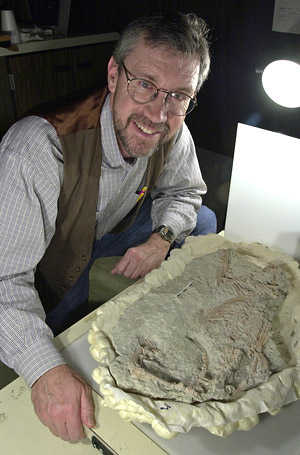 David W. Krause with a specimen of a Late Cretaceous mammal from Madagascar. Photo by John Griffin, Stony Brook University. |
A: I could compile a long list of ways in which paleontology is "important" and "relevant" in today's world. I could try to relate what we've learned about the past and how this knowledge pertains to various practical matters today the lessons of extinction, the relevance of fossils to the creation/evolution debate, what studies of paleoclimatology tell us about current global climatic change, how biostratigraphy helps guide exploration for non-renewable fossil fuels, how we can employ the fascination of dinosaurs to teach children how to learn in school, how we're anchored in our biological past and the influence that knowledge has in forming our views of self, and so on. There are clearly myriad ways in which paleontology is both important and relevant today. I could also underscore that we may not realize now the relevance of our paleontological research for future discoveries in other, more applied fields. But, in actuality, I perhaps don't have as strong a compulsion to force the issue as many of my colleagues. It's part of the human condition to be curious and I don't think we need to apologize for the fact that most of what we do as paleontologists, much of what we investigate, most of what we learn is, in fact, not particularly relevant or is even completely irrelevant in today's world. However we might try to sell ourselves as "applied" scientists, the vast majority of us aren't. We're simply fascinated with past life; it's what drives us and I don't feel it necessary to justify that fact through the cloak of relevance.
Q: How did you become a paleontologist? Is this what you always wanted to do?
A: As a young kid, and even as a teenager, I assumed I would be a rancher. I grew up on a ranch in southeastern Alberta, Canada, in the middle of nowhere, and started my education in a one-room schoolhouse that my four brothers, my sister, and I got to in a horse and buggy. I was pretty oblivious to anything at all in the world of paleontology
I doubt I even knew what the word "fossil" meant
until one Sunday, when I was maybe ten, the grain elevator operator from the closest town came by and asked my father if he could take me to look for dinosaur bones on our land, in the breaks of the South Saskatchewan River. I was surprised that my father allowed me to take a day off from work and do such a frivolous thing. I found a tail vertebra of a hadrosaur that day and must admit that it intrigued me to no end. It opened up a new world to me. But the possibility of embarking on a paleontological career didn't really enter my head until the summer after my freshman year in college, when a young professor by the name of Richard Fox took me on as a field hand, something for which I will be forever grateful. I was immediately hooked. The opportunity to live and work in the great outdoors coupled with the thrill of discovering animals long extinct seemed like an unbeatable combination. It still does today and I'm as "pumped" about it now as I was then
maybe even more so.
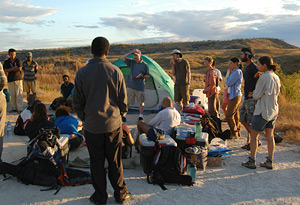 David, in front of the tent, organizes field and humanitarian crews at Berivotra camp, northwestern Madagascar, summer 2007. Photo by Philip Currie, University of Alberta. |
Q: What is your area of expertise or of greatest interest in paleo? What most fascinates you about this particular area of paleo?
A: That question is a lot harder to answer than it was, say, 15 years ago, when I would have characterized my expertise, as would have my colleagues, as being in early mammals, with specialization in groups like multituberculates and gondwanatherians. But 15 years ago I initiated a field research program in Late Cretaceous strata of Madagascar, the goal being to discover mammals. We found them, but we found so much more. The deposits in which we've been working have yielded an abundance of exquisitely preserved specimens of everything from huge sauropods and knobby-headed theropods to bizarre, pug-nosed and hippo-headed crocodiles to a monstrous, predatory frog. The vast majority of these are completely new to science. These discoveries alone have allowed me to diversify my interests substantially. But, working with Ray Rogers of Macalester College in Minnesota, unraveling the geological context for these specimens, has become just as fascinating. And, in a still broader context, many of the discoveries are directly relevant to testing the biogeographic hypotheses about the timing and sequence of fragmentation of the southern supercontinent Gondwana that formed the initial impetus for the project. The bottom line is that the Madagascar project has forced me to broaden my horizons considerably, to the point where I'm not sure I have expertise in any particular specialty anymore
but I'm sure having a ton of fun.
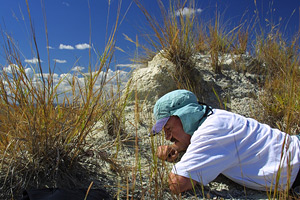 Looking for microfossils in northwestern Madagascar, summer 2001. Photo by Ashutosh Kaushesh, Stony Brook University. |
Q: What is a "typical" day like for you? Do you go on "digs?"
A: I can't really say that I have anything that you could call a "typical" day. Every day is quite different, and most days I end up doing a zillion things that I didn't anticipate doing when I first woke up. But that's the beauty of it. Sure, I teach, do research, and have administrative responsibilities like most university professors, but there's never a day where I do the same thing
and consequently I'm never bored. About the only constants are that I'm an early riser, I have lunch with my colleagues (a tradition that has provided a constantly stimulating environment and kept us a strong, unified group), and make regular visits to our prep lab to see what treasures our two preparators have uncovered during the day.
My digs are done during the summer months and, for the last 15 years, have been focused on Cretaceous deposits on the island of Madagascar, off the southeast coast of Africa. These are great fun because I have an outstanding, hard-working crew of colleagues and students, from both North America and Madagascar and the fossils are stupendous.
Q: What problem(s) or question(s) are you currently working on? What attracted you to this problem?
A: This is a great question because I think that much of the rationale for what is done in paleontology, and science in general, today is simply that it hasn't been done before
or because there's some new technique that has become available. That's fine but does not, in my opinion, capture the essence of scientific inquiry and discovery. Questions, not leftovers or techniques, should be the motivation for what we do.
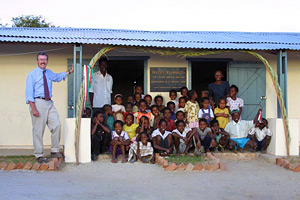 David at the inauguration of the first school built by the Madagascar Ankizy Fund, summer 2001. Photo by Ashutosh Kaushesh, Stony Brook University. |
Although there are many questions relating to phylogenetic position, functional morphology, biostratigraphy, paleoecology, etc. of each and every animal that we find in Madagascar, the over-arching questions relate to the composition of the entire fauna that we're assembling. We've gone out of our way to collect everything, whether plant, invertebrate, or vertebrate, because they all yield parts of the story. The broadest questions pertain to biogeography. We hypothesized, based on the literature that was current 15 years ago, that many of the ancestors of today's highly endemic fauna on Madagascar would be present in the Cretaceous and, based on then-current paleogeographic reconstructions, that the Late Cretaceous vertebrates that we might find should be most closely related to those from the Indian subcontinent. My initial attraction to these problems stemmed from what was then considered to be one of the greatest mysteries of natural history: how, when, and from where the ancestors of that highly endemic biota got to Madagascar. We don't have all the answers yet and, indeed, I think we've only begun to sample the tip of the paleo-iceberg, so to speak, but we now have some pretty good clues. And many of them aren't what we predicted. For instance, finding out that several of the vertebrates that we've found in the Late Cretaceous of Madagascar had close relatives that lived at the same time in South America has forced us to rethink the possibilities of indirect physical connections between those landmasses that lasted much longer than indicated in most paleogeographic reconstructions.
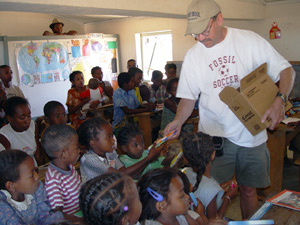 Handing out toothbrushes at a Madagascar Ankizy Fund school, summer, 2003. Photo by Désiré Randrianarista, Madagascar Institute for the Conservation of Tropical Environments. |
Q: What is the most exciting or interesting thing that has happened to you as a paleontologist?
A: I have no idea where to start. In point of fact we've had the good fortune of making some incredibly interesting finds in Madagascar, and every one seems to be more significant than the next, and every one leads to new questions and new ideas. And, the older I get the more excited I am about providing opportunities for young people in the field, including my students and young colleagues here in the U.S. but also those in Madagascar. But one of the most interesting and exciting things that has happened to me as a paleontologist is unrelated to paleontology
but would never have happened had I not been a paleontologist. Let me explain. The bottom line is that you never know where your life might lead you. Had it not been for paleontology, I wouldn't have ended up spending months and months of my time in Madagascar. As I said before, we found some pretty incredible fossils there. But we also found some of the most abandoned and destitute children in the world, children who couldn't read and write, children who'd never been seen by a doctor or dentist and who were dying of easily treatable ailments. We decided to do something about it and this ultimately led me to start an organization, the Madagascar Ankizy Fund, in 1998. "Ankizy" means "children" in the Malagasy language and the goal of the organization is to build schools and provide healthcare to children living in remote areas of the island. My colleagues, my students, and I have been able to make some progress built three schools (a fourth is under construction), renovated an orphanage, dug several wells, taken medical and dental teams to Madagascar from Stony Brook but there's still so much more that we can do. A good chunk of my time is now actually devoted to fund-raising for this cause. If anybody's interested, see the website.
Q: Do you have to have a Ph.D. to become a paleontologist?
A: It all depends upon what kind of paleontologist you want to become. If you wish to conduct original research, yes, I believe that you should obtain a Ph.D. This, by the way, has nothing to do with ivory towers. It's about acquiring the appropriate training and tools, and a broad knowledge base, to identify significant research questions, devise innovative means to address those questions, collect and analyze data, interpret the results, and so on. But there are several other great and rewarding careers in paleontology that do not require a Ph.D. These include being a preparator, a collections manager, a lab technician, a park ranger, etc.
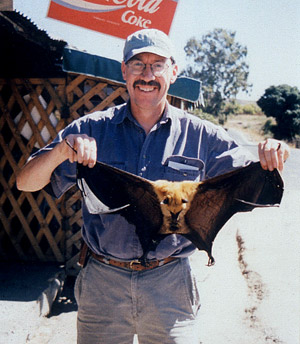 David holds a menu item (fruit bat) outside a restaurant, northwestern Madagascar, summer 2001. Photo by Kate Reluga, Stony Brook University. |
Q: What advice would you give to someone considering a career in paleontology?
A: For anyone who desires to become a professional paleontologist, it's simple
work hard and follow your dream. But also be realistic
there are very few jobs out there, so be flexible and do your best to be marketable in different areas. Many paleontologists, like me for instance, get jobs teaching in related fields. I teach human gross anatomy, which I've grown to love, in a medical school but, at my particular institution, I'm allowed, even encouraged, to do research in paleontology. The President here at Stony Brook has even gone so far as to welcome the installation of a mounted skeleton of a dinosaur we discovered in Madagascar, Majungasaurus, in the lobby of the Admin Building, right in front of the Bursar's Office! She calls it "Stony Bones" and proudly claims that we're the only university to have a predatory dinosaur guarding the institution's money.
As far as career preparation is concerned, there are the obvious things of taking a hefty dose of science courses in high school and college but, more than anything, I'd advise getting involved as early as possible make contacts with paleontologists, take independent research courses focusing on a paleontological question, try to get on field crews, volunteer to work in a lab, etc. And I'm not a strong advocate for jumping directly into a Ph.D. program after being an undergrad; doing so is appropriate for only a few those who have had ample research experiences as an undergrad. Many undergraduate students do well in their coursework but gain little experience in conducting actual research. For many, jumping from that environment, one in which they've had little or no research experience, into one in which they have to design and carry out a five-to-seven-year research project, oftentimes the largest in a paleontologist's career, is just too much the jump is too big. I'm a strong advocate of research Master's degrees, where not quite as much is bitten off.
And, since you asked, I also advocate choosing a graduate program wisely. Don't choose one on the basis of, say, the presence of one particular professor (look more broadly at the entire program) or the size of the stipend (short-term pain for long-term gain, as they say) and don't choose one in which the researcher will tell you what you'll work on. That's the easy way out and a gross disservice to you. Graduate programs should create an environment in which students learn how to identify significant research questions because, in fact, that's what they'll have to do once they graduate. If they're assigned a topic and told how to carry it out, they'll have missed a critically important, though difficult, creative step in their training.